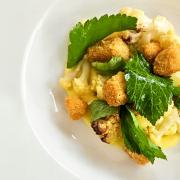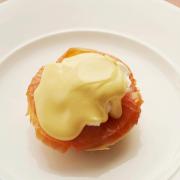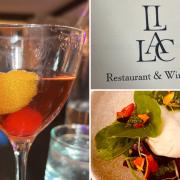A Dorset worm farmer has ditch his wrigglers in favour of a real gourmet slow food - snails, Mark Donovan meets the man behind Dorset Escargot
Real Slow Food Mark Donovan gets on the snail trail of a Dorset farmer who is raising this gourmet’s gastropod for the table.
Gordon Ramsay is responsible for many things, probably most currently television’s F Word. But even he would be surprised if he knew that he provided the inspiration for a cottage industry near Wimborne in Dorset that’s a runaway, or should that be a slither away, success!Worm farmer Tony Walker and his wife-to-be, Claire, were fascinated by the idea of raising snails for the gourmet food market after watching Gordon Ramsey interview the owner of a Devon snail farm on the F Word. The couple started to investigate how they might add these slimy, antenna-headed creatures, technically known as gastropods, to their farming repertoire. The pair arranged a day out at the snail farm featured on the programme to see how it was done. As a result of their visit, Tony and Claire were convinced they could master the slow art of raising snails for the table. “What we discovered in our initial meeting is that the common or garden snail – first introduced by the Romans – are simply not right for cooking as they are too small,” says Tony. “We were advised to source the helix aspersa maxima as the ideal snail for indoor farming and many chefs agree that they offer the best taste.” The initial intention was to run snail production alongside the existing worm farm, which was already successfully supplying fishermen and gardeners. However, it soon became evident that snail farming is a highly labour-intensive process and would require the undivided attention of Tony and Claire. So, in December 2006, the worm farming business was abandoned to make way for the birth of Dorset Escargot, and in just three years the business has grown into one of the leading fresh snail suppliers in the UK. But it wasn’t all plain sailing as Tony explains.“Our first attempt was an unmitigated disaster,” he admits. “The first batch of a thousand breeding snails were imported from Serbia in December 2006 but sadly they had all died by the following February.” Fortunately, Tony was able to salvage some of the eggs and it was these that would form the nucleus of his initial breeding stock. Snails are hermaphrodites, so every snail can lay eggs. However, they need to couple with another snail in order to fertilise each others eggs.Four years on, Tony and Claire have snail husbandry down to a fine art, producing up to 6,000 snails a week, roughly 3 tonnes a year for the table. The snail farm comprises a huge poly tunnel which is housed inside a 4,000 sq ft farm building. “The snail eggs are laid in nests, with around 100 eggs to each. They resemble miniature ping-pong balls and are opaque white in colour,” explains Tony. “They take three weeks to hatch. The baby snails are put into plastic boxes, in an insulated room kept at a constant temperature, where they begin feeding. After a few weeks the best are selected for a special high-protein diet of formulated dried food. We also treat them to a daily shower in order to wash away any waste matter and give them as happy a life, as possible.” Four weeks later they start fattening them up. Once again they are graded for size and the stock rate per box is changed again. At this point Tony adds his secret ingredient to the food mix – dried herbs – which he swears make his snails taste better than anybody else’s. The rejects, namely those that don’t grow large enough, are held back for further feeding until they make the grade. The snails are ready for market at 15 weeks when they are around 12 grams in weight.“It’s at this point in their lifecycle that they offer the best meat quality and flavour. We stop feeding them, but continue to wash them daily in order to completely clear their systems of waste matter,” continues Tony. “The snails are then placed in mesh bags where they are hung and dried for three to four days.”Finally, they are stored in a large commercial fridge so that they fall into a state of hibernation. The day prior to delivery the snails are blanched in boiling water, with plenty of salt and vinegar, for three minutes. As they are tucked up in their shells in a state of hibernation, the meat is a nice circular shape without the extended ‘foot’ or antenna. They are then de-shelled and vacuum-packed prior to delivery.It took the couple two years to perfect the process of creating the ultimate gourmet snail. But painstaking experimentation with growth rates, stock numbers, feeding various types of food, and varying temperature and light levels has finally paid off. Tony believes he has the best tasting snails in the country. “Not only are they tasty, they are also very healthy, being almost entirely fat-free and packed full of protein.”Though snails may not be everybody’s cup of tea, some of the most celebrated gastronomes in the UK place snails high on their list of favourites. Heston Blumenthal is perhaps the most celebrated, with his ubiquitous snail porridge, and Gary Rhodes is another gastropod fan and an enthusiastic customer of Dorset Escargot. Tony is determined to spread the word about his delicious snails, particularly in such a foodie county as Dorset, where he was born and bred. So he was particularly excited when the avant-garde owners of the Bridge House Hotel in Beaminster decided to snatch up the gastropod gauntlet and approached him to discuss the idea of adding fresh snails to their menu. The result was the launch of their All Day Snail Breakfast, a delicious fusion of Gallic and English cuisine created by their Head Chef, Steve Pielesz. “Rather than simply serve snails in garlic butter, we wanted to try something new that would tempt both connoisseurs and newcomers,” says Steve. “We loved the taste and texture combination; the snails are soft, juicy and have a similar texture to a mushroom. Since appearing on the menu they have been flying out the door. Dorset diners clearly have extremely cultured palates,” he adds.Tony is keen to impress that fresh snails are a world apart, in terms of taste, from those served in tins. “Many snails served in France are actually out of a tin and are chewy and gritty, whereas fresh snails take on a taste of their own – there’s simply no comparison,” he concludes. And so Dorset adds yet another gourmet ingredient to its every expanding list, an ingredient that truly can claim to be real slow food.
You can buy snails direct from Dorset Escargot by calling 01202 549 733 or click here to visit thier website. The All Day Snail Breakfast is available at the Beaminster Brasserie 01308 862200.


























